
Guests
- Katrina vanden Heuveleditorial director and publisher of The Nation magazine and columnist for The Washington Post.
Russian missiles struck Ukraine’s capital of Kyiv for the first time in over a month on Sunday. This comes as Russian and Ukrainian forces continue to battle over control of the eastern city of Severodonetsk and Russian President Vladimir Putin is warning Western nations against supplying longer-range missile systems to Ukraine. “The longer this war goes on, the much more difficult it is to end it,” says Katrina vanden Heuvel, editorial director and publisher of The Nation magazine and columnist for The Washington Post. Vanden Heuvel says U.S. corporate media is responsible for what she calls a “one-sided debate” on Ukraine, which is greenlighting unprecedented spending on weapons over the importance of negotiations.
Transcript
AMY GOODMAN: We begin today’s show in Ukraine, where Russian missiles struck the capital Kyiv for the first time in over a month Sunday. This came as Russian and Ukrainian forces continue to battle over control of the city of Severodonetsk in eastern Ukraine. Ukrainian President Volodymyr Zelensky says Russian forces now occupy roughly one-fifth of Ukraine. On Sunday, Russian President Vladimir Putin warned Western nations against supplying longer-range missiles to Ukraine.
PRESIDENT VLADIMIR PUTIN: [translated] If the longer-range missiles are going to be supplied, we’ll make certain conclusions and use our own means of destruction, which we have enough to strike at those targets which we have not yet been hitting.
AMY GOODMAN: Putin’s comment comes after the United States announced it approved a $700 million security assistance package for Ukraine, including four High Mobility Artillery Rocket Systems.
Meanwhile, has said, quote, “We must not humiliate Russia so that the day when the fighting stops we can build an exit ramp through diplomatic means” — that said by French President Emmanuel Macron. Meanwhile, Ukraine’s foreign minister criticized Macron’s comments, saying, quote, “Calls to avoid humiliation of Russia can only humiliate France and every other country that would call for it.”
For more, we’re joined by Katrina vanden Heuvel, publisher of The Nation magazine, columnist for The Washington Post. Her recent piece there is headlined “We need a real debate about the Ukraine war.”
Welcome, Katrina. Lay out your argument.
KATRINA VANDEN HEUVEL: Well, I think what we’ve seen, Amy, over these last years is that the corporate media has a one-sided debate. You don’t hear from informed, analytical scholars or writers who are not there to justify but to provide history and context about what we’re witnessing today in the proxy war, but the war between Ukraine and Russia. And there’s a marginalization of those voices and a preference for voices which are about how to escalate the war, how to cover the military, not cover the history. And I think the venerable journalist Walter Lippmann once said, “When all think alike, no one thinks very much.” And that seems to be the framework in what we’re witnessing. And I think it’s very important that there’s not an intellectual no-fly zone, even while understanding how barbaric, how illegal the Russian war against Ukraine is.
But this war is going to end, and how it ends is a matter of discussion that isn’t being shown in any real way on our screens in corporate media. I will say there have been a few cracks. May 19th, The New York Times ran an important editorial raising questions about what U.S. strategy is. And there have been a few articles in these last days which begin to question concerned about an unlimited war. We’ve now put through about — the United States, Amy, you mentioned the $70 million. There are — $57 billion has been given to Ukraine in these last months and years. And the question of where that money is going and how that may escalate a protracted war between — with a nuclear power, I think, is critical to raise, to understand and provide context for.
AMY GOODMAN: So, comment on Macron’s comments this weekend —
KATRINA VANDEN HEUVEL: Yeah.
AMY GOODMAN: — saying, “Do not humiliate Russia.” The significance of this, and also Putin saying, “If you send these advanced missile systems to Ukraine, we’re going to hit places we haven’t touched yet”?
KATRINA VANDEN HEUVEL: So, we’re into more than a hundred days. It’s clear, as Zelensky said, that Russia now controls maybe 20% of Ukraine, but Russia seems to be settling into the eastern part, Severodonetsk, and this is the Donetsk region, Luhansk, Donetsk republics. And I think that that is a measure of where you see parameters for a peace agreement. And I just want to say something which I think is quasi-subversive. A negotiation is not appeasement. And I think what’s happening with the provision of weapons may well be, as some argue, that Ukraine needs more leverage to come to the negotiating table. That’s an argument. But there are — it’s time now to really push for high-level diplomatic initiatives, which have happened, Amy.
Macron maybe saying we shouldn’t “humiliate” Putin might have been the wrong word, but, you know, what’s interesting to me is there’s all this talk of how unified the Western alliance has been, how NATO allies are so unified. But, in fact, what we’re witnessing here, it seems to me, is a division between what Donald Rumsfeld during the Iraq War called old and new Europe. New Europe — Baltics, Eastern European countries — fearful, having been occupied by the Soviet Union, of Russian aggression, witnessing Ukraine, but France, Germany — and it’s not just the gas and oil, but it’s a sense that they live on the same continent, that there needs to be agreement and not a kind of sundering or instability, because it’s lost here, but this war, again, is going to end, and what emerges will be — whether it’s mutual security or constant insecurity and instability, again, with nuclear-armed weapons, is, I think, a very fundamental issue, and Macron was right to raise this.
AMY GOODMAN: Katrina, you have been studying Russia and in Russia for decades. What sense do you have of the Russian public and where they stand right now, the significance of high-level officials differing from — one even quitting over this — and any pressure that you think is effective from within that’s being placed on Putin?
KATRINA VANDEN HEUVEL: So critical, Amy, to talk about pressure from within the Russian opposition. The Russian government has worked hard to chill, to repress the protest that first erupted after the Ukrainian war. Many Russians have relatives in Ukraine, family. And I think there was a shock in the first instance. There has been a rallying to the Russian government, partly because of the propagandistic state television portraying now that it’s a proxy war. It’s easier for Russians to fix on fighting NATO, the U.S. than Ukraine. I have a friend outside of Moscow who says she feels doubly shamed. She’s shamed by her government, but she’s also shamed by the United States, NATO stigmatizing and, it seems, demonizing of all Russians, not understanding there are those who oppose this war.
There are also what we saw during the Afghan War when the Soviet Union was involved: mothers, those who are angry and horrified by the body bags that are coming back to Moscow and the fresh gravesites. So that’s a factor, and the Russians have been very careful to keep numbers low, even though they’re losing thousands a month. And Zelensky, by the way, noted, Amy, just a few days ago, that Ukraine is losing 50 to 80 men a day, which, you know, in comparative terms, is more than the United States lost at the highest point of Vietnam in 1968.
I will note that my longtime friend, the editor of the independent newspaper Novaya Gazeta, who received — co-received the Nobel Peace Prize in December, has just auctioned his Nobel, or announced he will, and contribute the money, which he thinks might be $100 million, to Ukrainian refugees. The newspaper continues to operate in Riga, in the Baltics, as do a number of other newspapers, independent papers, critical of the Putin government.
AMY GOODMAN: So, what do you make of who stands where in the U.S. Senate? I mean, you have the arch, well, libertarian, conservative, anti-civil rights leader, Rand Paul — right? — the Republican Kentucky senator, who is an enemy of the other Kentucky senator — right? — the Senate Minority Leader Mitch McConnell, holding up a vote of weapons sales, saying, “Where is the oversight? We need an ombudsman.” And that — and, you know, finally, he caved on that. But you have the Republicans who are pressing against these weapons sales, and the Democrats and much of the — outside Fox — media, CNN, MSNBC, all just pushing forward, and when weapons sales are not happening, asking, “Why not?” or just weapons give-overs.
KATRINA VANDEN HEUVEL: Amy, our politics have been scrambled when it comes to U.S.-Russian relations for the last five, six years. You know, there is something that has emerged, which I think is a very important development in U.S. politics, foreign policy, which I would call the restraint caucus. This is the Quincy Institute, headed by Andrew Bacevich, Trita Parsi, Anatol Lieven, who was a guest on your program. These are members of the Quincy Institute who believe not in isolationism but that there is a different way for America to engage the world, with diplomacy, with restraint and with an understanding that America is stronger if it’s not a unipolar power, if it’s not policing the world and if it’s not triumphalist. Sadly, I think, on this issue particularly, on Russia, the progressive community is not at this moment offering, saying, you know, “Negotiations, let’s open a space for it,” but focusing more on Russia as a kind of demon and should be not in the civilized network of nations, and more weapons, more weapons. I think it’s important not to attribute this restraint caucus solely to the Rand Pauls or Josh Hawleys. It’s much broader and, I think, more representative of this country. And as you know, those in this country’s voices are not often heard inside Washington.
One thing that has fundamentally changed, Amy, since we last spoke, in these last weeks is, of course, what is the strategic focus of the U.S. involvement in Ukraine? Is it to — from the original concept, to defend Ukraine as a free, sovereign, independent country, or is it, as General Austin said, to degrade, to weaken Russia, or, as President Biden said and had to roll it back, Putin shouldn’t — you know, he shouldn’t be in power? And that’s a very different framework. It’s sort of comparable to the old debate between George Kennan’s containment, which was later changed in focus to rollback idea, which has dominated this country’s foreign policy.
And I think it’s important to understand that there are negotiations that have occurred in these last months. There was one in Istanbul between the Russians and Ukrainians. The FT, the Financial Times, reported in March that there was a 15-point plan that had been put on the table. You know, it’s easy to start a war than to end a war. And I do think surveys show that the longer this war goes on, the much more difficult it is to end it. And certainly, our weapons, which many may argue are critical to defend Ukraine from the barbarism of Russia, but they do lead to a more protracted war with all the ancillary nuclear problems, threats, perils and others. So, I think it’s pivotal inflection point, and I think people need to take steps.
You mentioned the Senate. I mean, we are facing midterm elections in November. Inflation, jobs, these are what lead the list. And I think for many presidents, including Biden and Trump and Obama, there was an understanding years ago that Ukraine was not a national security interest of the United States. And Obama did not send lethal weapons. Of course, it was before the Russian aggression. But I think that’s worth thinking about. How vital is Ukraine’s security? Yes, but not a commitment of extraordinary proportions.
I’ll end by saying I think Zelensky, who, you know, is an extraordinary figure, has talked about $5 billion to $7 billion a month needed to keep Ukraine aloft, alive and surviving. And that money — you know, the money is going to be needed for reconstruction of this ravaged country, for those displaced, for food and security, for all the issues we’ve talked about as extending from this war, which has had global impact.
AMY GOODMAN: Finally, the idea — we’re talking about, if this is a proxy war, you know, major nuclear countries, the United States versus Russia. What about that?
KATRINA VANDEN HEUVEL: Well, what’s interesting is, polls show that Americans now are thinking about the nuclear threat. Now, one thing that is of great concern, Amy, I’ve heard that there are no working groups, there are no groups talking at lower levels — U.S., Russian — about the nuclear issues, which are critical. We don’t have a nuclear arms infrastructure at the moment, Amy. It’s been shredded since 2002, the anti-ballistic missile system. START, very weak, extended 'til 2025, ’26, but all these other treaties are just torn apart. And the nuclear issue is terrifying. I mean, this is as dangerous, more dangerous than the Cuban Missile Crisis, which many don't remember, but it’s protracted. And the longer this goes on, the more an accidental incident, a miscalculation could occur, which is why, to some extent, by the way, these missiles being sent from the United States reach only 40 miles, because there is a terror that they might go into Russia and escalate, as Putin has threatened.
I will say June 12th, 1982, we’re marking the 40th anniversary this June 12 of a million people in Central Park to oppose the nuclear expansion at that time of Reagan and Gorbachev. And I think people — maybe this will focus people on the need for freeze, for build-down, for understanding the peril of nuclear weapons, while we live with so many other dangers. This is really horrifying that it has been raised as a possibility in this protracted — let us say, this proxy war, which is leading to a possible global war in its implications for the change of our political-military architecture.
AMY GOODMAN: I know I said “finally,” but this is really finally. What do you think could break the establishment consensus, with the media very much a part of that, even pushing Biden to go further, to sell more weapons at this point, to allow in those other voices?
KATRINA VANDEN HEUVEL: Well, I mean, that’s the question of our time, isn’t it? And I think that to listen to the people — I mean that, because I think people care about being a good force in the world, but are not up for this policing, this triumphalism. I think that it’s going to take those who understand the need to demilitarize.
At the beginning of the pandemic, Amy, there was a sense of return to an idea in foreign policy called common security — this was Olof Palme, this was also Mikhail Gorbachev — but an understanding that there are human security needs, to fight the pandemic, to fight global inequality, to fight food shortages and, of course, the existential crisis of climate change, which, by the way, in the $50 billion that has been put through to Ukraine, that’s far more than we’ve been spending to tackle and hold climate crisis. But I do think there’s a way of framing our security needs that could open up minds.
And I think this idea I talked about, about restraint, it needs to be more broadly understood, because I think it’s much more in the American tradition than what we see from the neocons or the neoliberal interventionists who have dominated inside Washington. And I do think Biden is under terrible pressure. And it’s a pressure, as I’ve said, I said in my Washington Post column, that begins in the center right and extends to the right right. So you need the pressure from these forces. And they’re there, but he hasn’t opened up his administration or let them in or listened to them. But if you had a more open media and a more open-minded administration, these people are young — Blinken, Jake Sullivan — but they’re recycling the oldest and worst ideas in our foreign policy.
AMY GOODMAN: Katrina vanden Heuvel, we want to —
KATRINA VANDEN HEUVEL: And we haven’t even talked about China. Sorry.
AMY GOODMAN: Sorry. Go ahead.
KATRINA VANDEN HEUVEL: We haven’t even talked about China, in the context that they were supposed to move on to China, but they’re doing so in a way to challenge and treat China as a terrible threat. These countries are not to be admired, in many ways, but they’re needed, not as friends, but as partners, in dealing with some of the grave issues of our time. And that is a realism, one hopes, a realistic approach, because there are a lot of people putting her head in the sand and thinking we’re going to have double wars, Russia and China. This is not a way to build a world.
AMY GOODMAN: I want to thank you for being with us, Katrina vanden Heuvel, publisher of The Nation magazine. We’ll link to your piece in The Washington Post, “We need a real debate about the Ukraine war.”
Next up, the House committee investigating the deadly January 6th insurrection holds its first hearing on Thursday. Democracy Now! will be live-streaming it at 8:00 Eastern [Daylight] Time. Stay with us. We’re speaking with Pulitzer Prize-winning columnist Will Bunch.

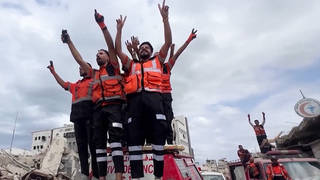
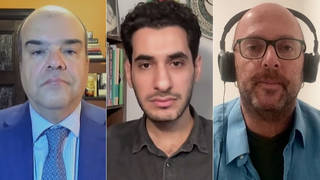
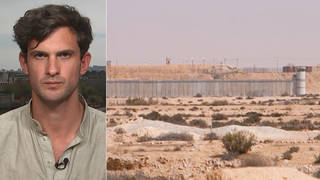
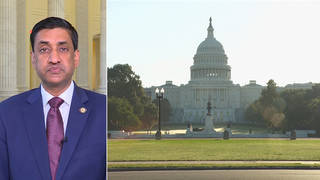





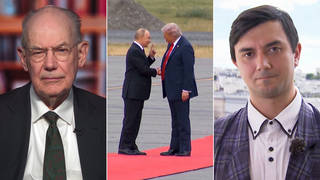
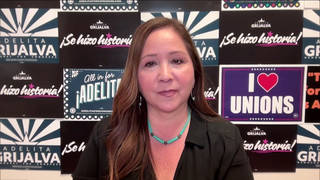
Media Options